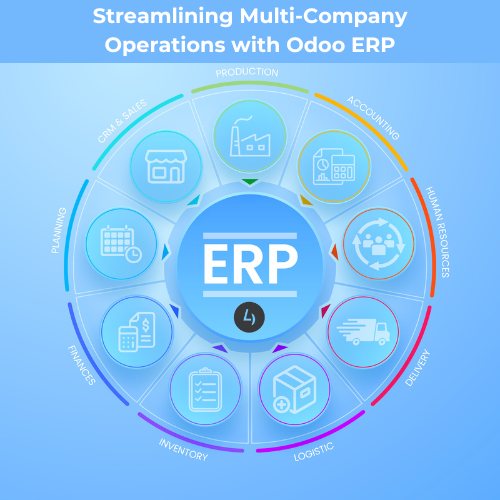Streamlining Multi-Company Operations with Odoo ERP
In the current global business landscape, organizations are increasingly managing operations across multiple subsidiaries, branches, or regions. While this expansion opens up new opportunities, it also presents challenges in ensuring operational coherence, maintaining consistent financial reporting, and streamlining processes across different entities. For businesses seeking to simplify these complexities, Odoo ERP offers a robust, scalable solution to effectively manage multi-company operations.
In this blog, we will explore how Odoo, an integrated suite of open-source business applications, can streamline operations across multiple companies, enhance productivity, and provide a seamless experience for businesses with complex, multi-entity structures.
What is Odoo ERP?
Odoo is a comprehensive open-source ERP system that consolidates a wide range of business functions, including finance, human resources, inventory management, sales, CRM, manufacturing, and more, into a single platform. Odoo’s modular approach allows organizations to tailor the solution to their specific needs, whether they are managing a small business or a large enterprise with a global presence.
For businesses managing multiple entities, subsidiaries, or regions, Odoo offers a powerful multi-company framework that ensures all aspects of operations are efficiently coordinated.
Why Odoo is an Ideal Solution for Multi-Company Operations
1. Centralized Management Across Multiple Entities
One of the primary advantages of Odoo is its ability to provide centralized control over several companies from a single database. Whether an organization operates with multiple subsidiaries, franchises, or international branches, Odoo’s multi-company module enables businesses to maintain a unified system while ensuring that each entity retains its unique operations, financials, and compliance requirements.
Key benefits include:
- Unified platform for managing different companies, eliminating the need for multiple systems or databases.
- Real-time access to operations across all companies, ensuring transparency and improved decision-making.
- Data isolation between companies, enabling secure and customized access to information while maintaining confidentiality.
2. Simplified Inter-Company Transactions
Managing financial and operational transactions between different companies can be one of the most complex aspects of running a multi-company organization. Odoo addresses this challenge by automating inter-company transactions, including the creation of invoices, payments, stock transfers, and journal entries across different entities.
With Odoo, businesses can:
- Automatically generate inter-company journal entries and invoices, ensuring accuracy and reducing manual reconciliation efforts.
- Streamline stock transfers and manage inventory across multiple warehouses or locations seamlessly.
- Track and manage payments across different companies, improving cash flow visibility and reducing the likelihood of errors.
These features help organizations avoid the operational bottlenecks associated with cross-company transactions, facilitating smoother business operations.
3. Efficient Inventory and Warehouse Management
Multi-location businesses often face difficulties in maintaining an organized and efficient inventory system. Odoo’s multi-company functionality integrates inventory management across all subsidiaries, providing a single view of stock levels and product movements in real time. This enables businesses to optimize warehouse operations and reduce inventory discrepancies.
Key features include:
- Centralized inventory visibility across multiple companies and locations, improving order fulfillment and supply chain management.
- Automatic stock transfers between companies, streamlining the movement of goods between locations without manual intervention.
- Comprehensive reporting tools for monitoring inventory turnover, stock levels, and demand across all companies.
This centralized approach to inventory management helps reduce overhead costs, improve operational efficiency, and enhance the customer experience.
4. Tailored Financial and Accounting Reporting
In a multi-company setup, organizations need to generate accurate financial reports for each entity while consolidating information at the group level. Odoo’s advanced financial management module allows businesses to maintain separate accounting records for each company while providing the flexibility to generate consolidated reports for the entire organization.
Odoo’s financial features include:
- Separate chart of accounts for each company, ensuring compliance with local regulations and tax rules.
- Consolidated financial reports that allow businesses to evaluate performance at both the individual company level and group level.
- Automated tax calculations for different jurisdictions, helping organizations manage compliance in multiple regions.
- Multi-currency support to handle transactions in different currencies, making it easier for international businesses to manage global operations.
This flexibility ensures that businesses can navigate complex financial landscapes while maintaining transparency and compliance with local regulations.
5. Comprehensive HR and Payroll Management
Managing human resources across multiple companies can be time-consuming, especially when handling employee payroll, benefits, and attendance. Odoo’s Human Resources and Payroll modules support multi-company configurations, enabling organizations to manage employee data, payroll calculations, and HR processes efficiently across different entities.
Key functionalities include:
- Employee management across different companies, with the ability to assign employees to specific companies or departments.
- Payroll and tax management tailored to local requirements for each subsidiary, ensuring compliance with regional laws and regulations.
- Leave and attendance tracking for employees across multiple companies, ensuring accurate records and minimizing errors in compensation.
By streamlining HR processes across multiple entities, Odoo reduces administrative burdens and helps businesses focus on their core operations.
6. Global Compliance and Localization
Odoo’s multi-company framework provides a high level of flexibility when it comes to complying with local regulations and accounting standards. Whether your subsidiaries are located in different countries or regions, Odoo ensures that each entity adheres to local laws while enabling the parent company to maintain global oversight.
Odoo supports:
- Localized taxation and reporting to comply with regional tax laws and financial regulations.
- Multi-currency capabilities to manage financial transactions across different countries and handle exchange rate fluctuations.
- Country-specific payroll configurations that account for local labor laws, tax rates, and social security contributions.
This ability to localize business processes while maintaining centralized oversight makes Odoo an invaluable tool for global organizations.
7. Enhanced Collaboration Across Companies
Odoo’s built-in collaboration tools, such as chats, internal messaging, and project management modules, facilitate seamless communication between teams across different companies. Whether it’s sharing files, discussing project details, or coordinating tasks, Odoo fosters collaboration and enhances overall productivity.
By integrating these tools into daily workflows, employees can share information, resolve issues quickly, and collaborate on projects, regardless of which company or location they are in.
Conclusion: Unlocking the Potential of Multi-Company Operations with Odoo
Managing operations across multiple companies can be a complex and time-consuming process, but Odoo offers a comprehensive solution that centralizes control, enhances efficiency, and ensures compliance across all subsidiaries. By providing powerful features for financial management, inventory control, HR processes, and inter-company transactions, Odoo enables businesses to streamline operations and improve coordination across geographically dispersed entities.
Key benefits of Odoo for multi-company operations:
- Centralized oversight with secure data isolation.
- Automated inter-company transactions for improved accuracy and efficiency.
- Unified inventory management to optimize warehouse operations.
- Tailored financial reporting and multi-currency support for international compliance.
- HR and payroll management across subsidiaries with local customization.
- Global compliance and localization capabilities for smooth international operations.
By implementing Odoo ERP, businesses can simplify the complexities of multi-company management, reduce operational overhead, and focus on growth and innovation. If you’re looking to optimize your multi-company operations, consider leveraging the power of Odoo to transform your business processes and achieve greater operational efficiency.
For a deeper exploration of how Odoo can support your multi-company business model, reach out to us today and schedule a consultation. Our team of experts can guide you in deploying Odoo ERP for maximum impact.


